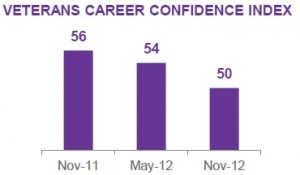 Just days after the nation honored it’s military veterans, a new survey says job seeking vets are putting in more effort, yet feel less confident than they did last year about finding a job.
Just days after the nation honored it’s military veterans, a new survey says job seeking vets are putting in more effort, yet feel less confident than they did last year about finding a job.
This survey from Monster offers the first full-year comparison of attitudes and job seeking challenges from both veterans and employers. Launched a year ago, the survey results are rolled up into what Monster calls the Veterans Talent Index. It paints a sometimes discouraging look at the difficulties and obstacles veterans, particularly those who served since 9/11, face in finding work.
That group of veterans have the highest unemployment among America’s 21 million military veterans. As a group, the so-called Gulf War-era II veterans had an unemployment rate of 10 percent last month. Women veterans in that group had an unemployment rate of 15.5 percent, nearly twice the 7.9 percent national rate.
No wonder then, that Monster found 80 percent of women vets and those transitioning to civilian life have little confidence in finding a job where they use the skills and ability they acquired in the service. Men are only slightly more confident; 78 percent said weren’t confident about finding a job that meets their abilities.
Confidence, however, rises with civilian work experience, Monster found. Of the 22 percent of veterans of both sexes who said they were confident about their job searching prospects, 7-in-10 had more than five years of civilian work. There are also differences between the group preparing to transition out of the military and those who have. The more ready a service member is to discharge and transition to civilian life, the more confident — up to a point — they are about landing a job.
Their biggest worries about their job hunt is similar to civilian concerns; 65 percent said they are most concerned about finding work that matches what they want in location, salary, and similar desires. But not far behind, 57 percent said having employers understand their military skills and experience and (53 percent) finding work they’re qualified for are other major concerns.
From what employers said in the survey, those are reasonable concerns. While almost 100 percent of employers told Monster they would recommend hiring a vet, and 69 percent have hired at least one vet in the last year, just half of the surveyed employers say veterans are prepared for the transition to civilian work.
“Veterans continue to bring a wide range of skills and expertise into the mix of professionals seeking employment, but it’s becoming increasingly difficult for veterans to communicate their skills into civilian culture when talking to a hiring manager,” said T McCreary, president of Military.com and vice president for Monster Worldwide.
Last week, a CareerBuilder survey said 29 percent of responding employers are actively recruiting veterans, while, 22 percent are planning on adding members of the National Guard.
The Monster report goes into much more detail — and not just about the challenges and obstacles veterans face. The report also highlights the kind of industries and jobs veterans most seek (customer service rep, administrative assistant, and security officer and high on the list). The geographic distribution of veterans’ resumes on Monster is detailed, showing states and cities with the highest percentages of veterans’ resumes.
There’s also a useful chart for both recruiters and veterans suggesting how each can better communicate.